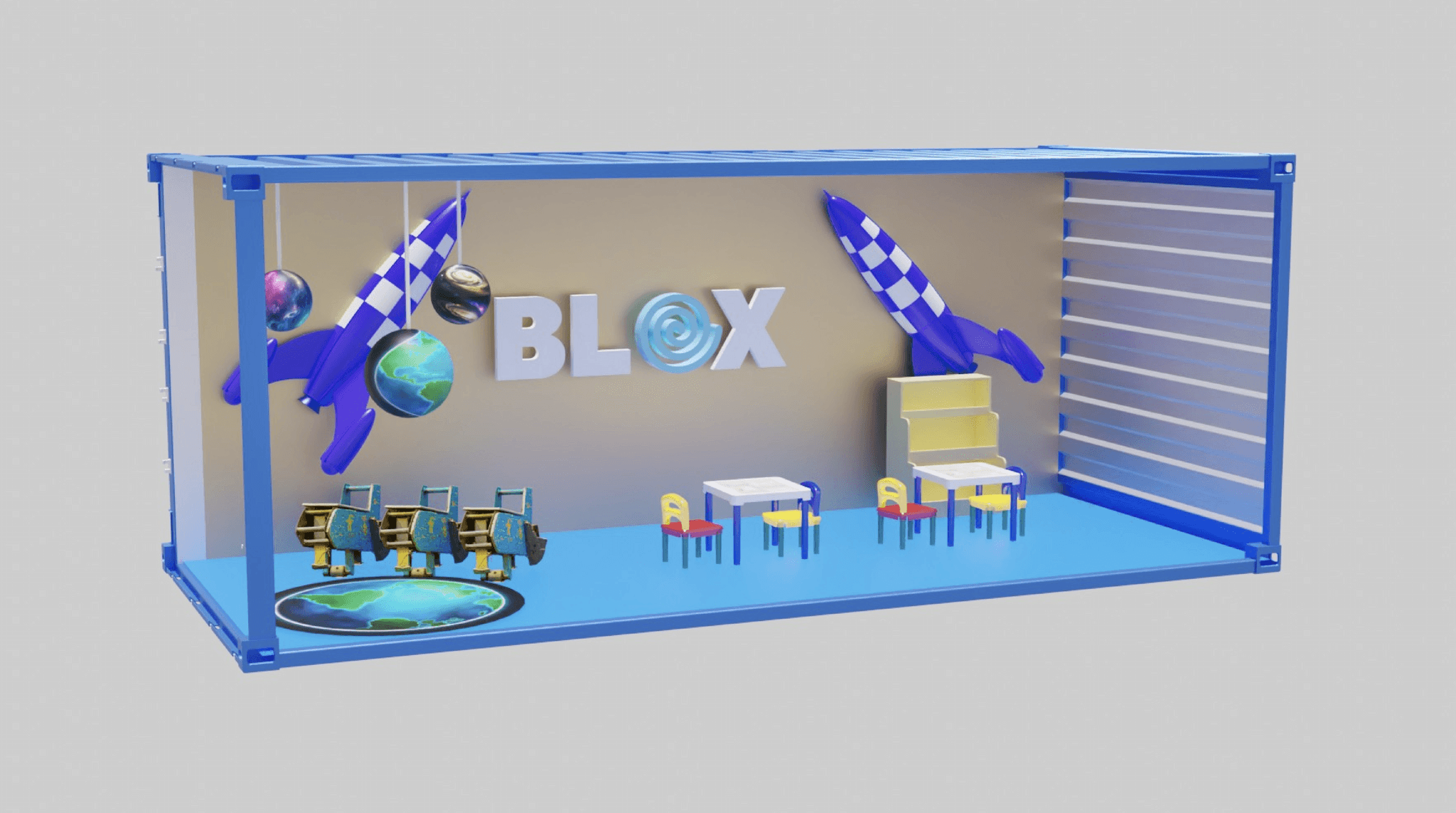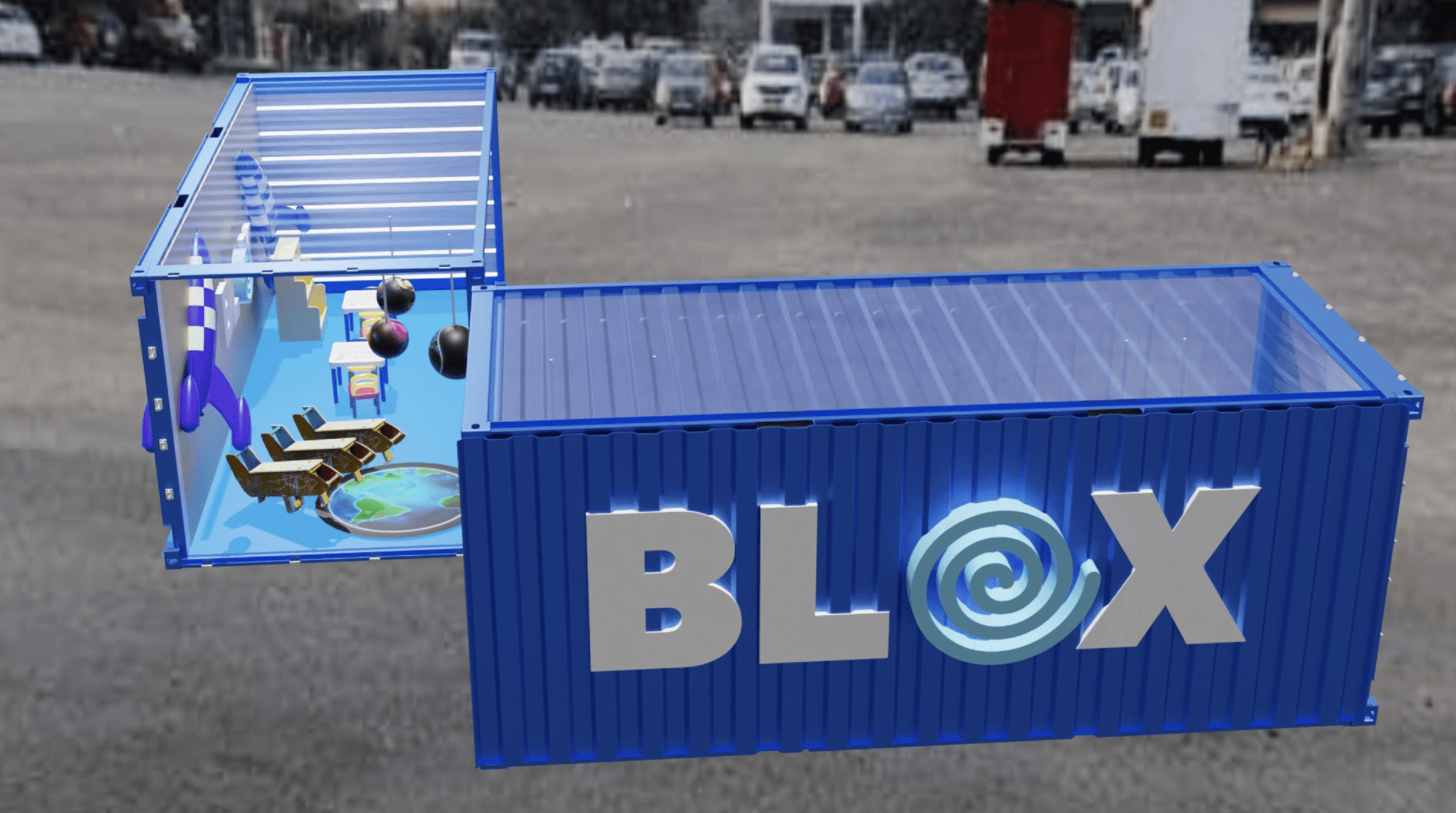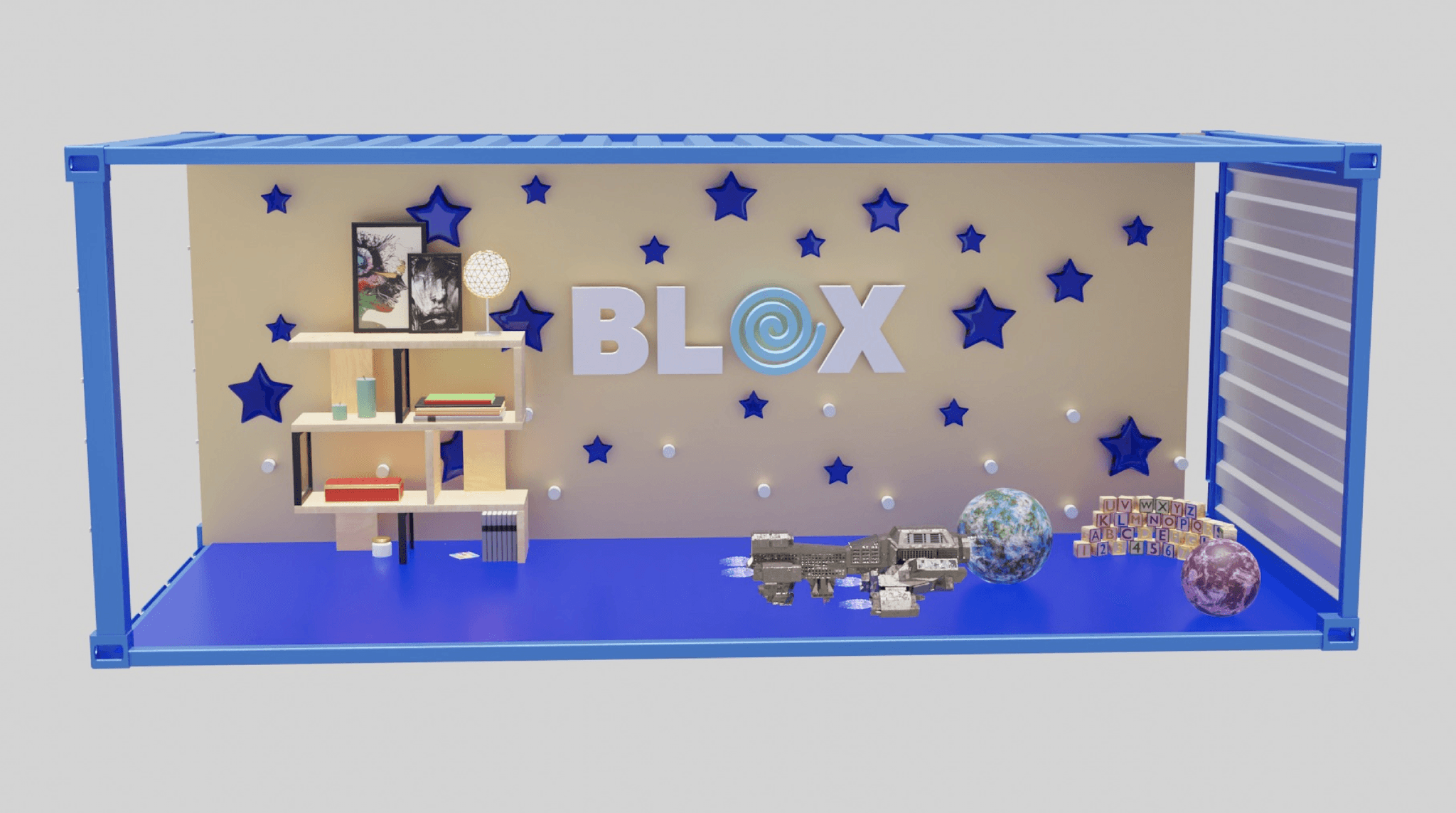Introducing…
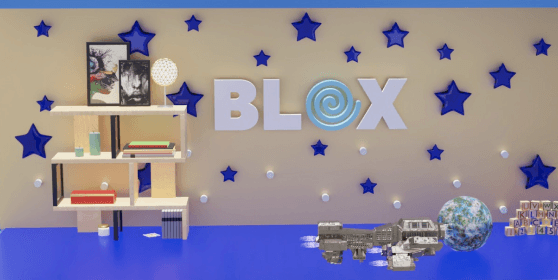
Mumbai
Recognizing the dense population of 21 million people in Mumbai, we understood the urgent need to carve out spaces for children in the city. Therefore, we strategically selected Mumbai as the launchpad for our inaugural Blox playground, embracing the theme of Space.
Location: Nehru Science Center
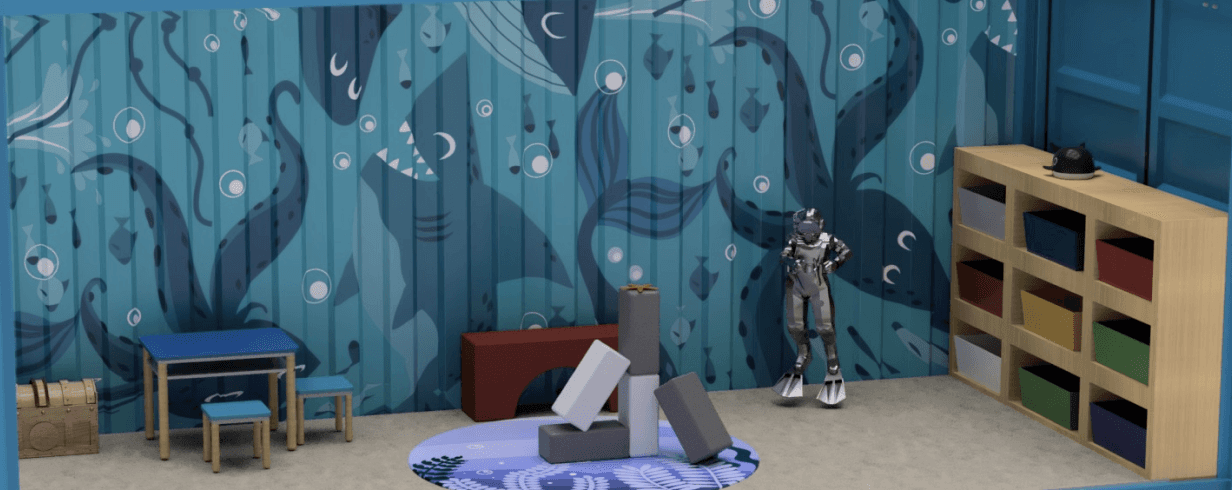
New York City
Despite New York City's coastal location, there's a lack of public beaches. Additionally, the city's real estate prices have emphasized a need for space-efficient solutions. These factors make NYC a prime location for an Ocean-themed Blox.
Location: New York Hall of Science
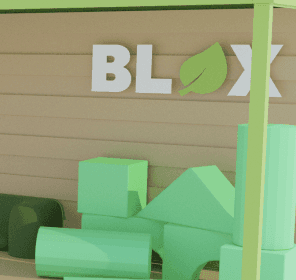
Hong Kong
Hong Kong's tightly packed high rises have limited the availability of green spaces for children. Addressing this challenge, we introduced our Forest-themed Blox in Hong Kong, offering a unique experience amidst the concrete jungle.
Location: Hong Kong Children's Discovery Museum
Product Overview
Blox is an inventive, transformative play and learning solution aimed at the urban landscapes that children aged 3-7 inhabit. This unique solution repurposes containerships into portable playgrounds, combining play and learning in a compact form that is compatible with densely populated cities.
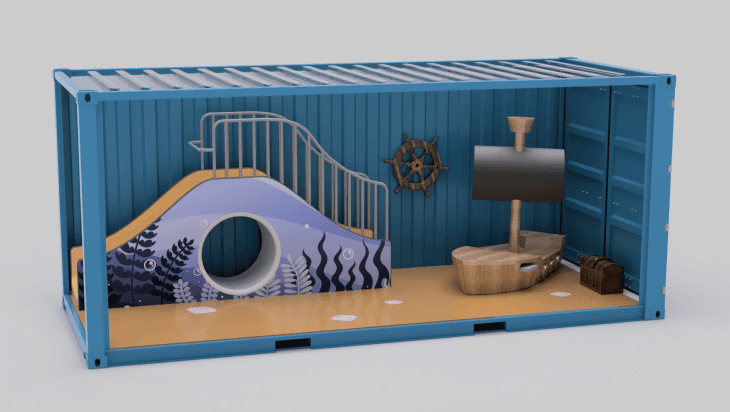
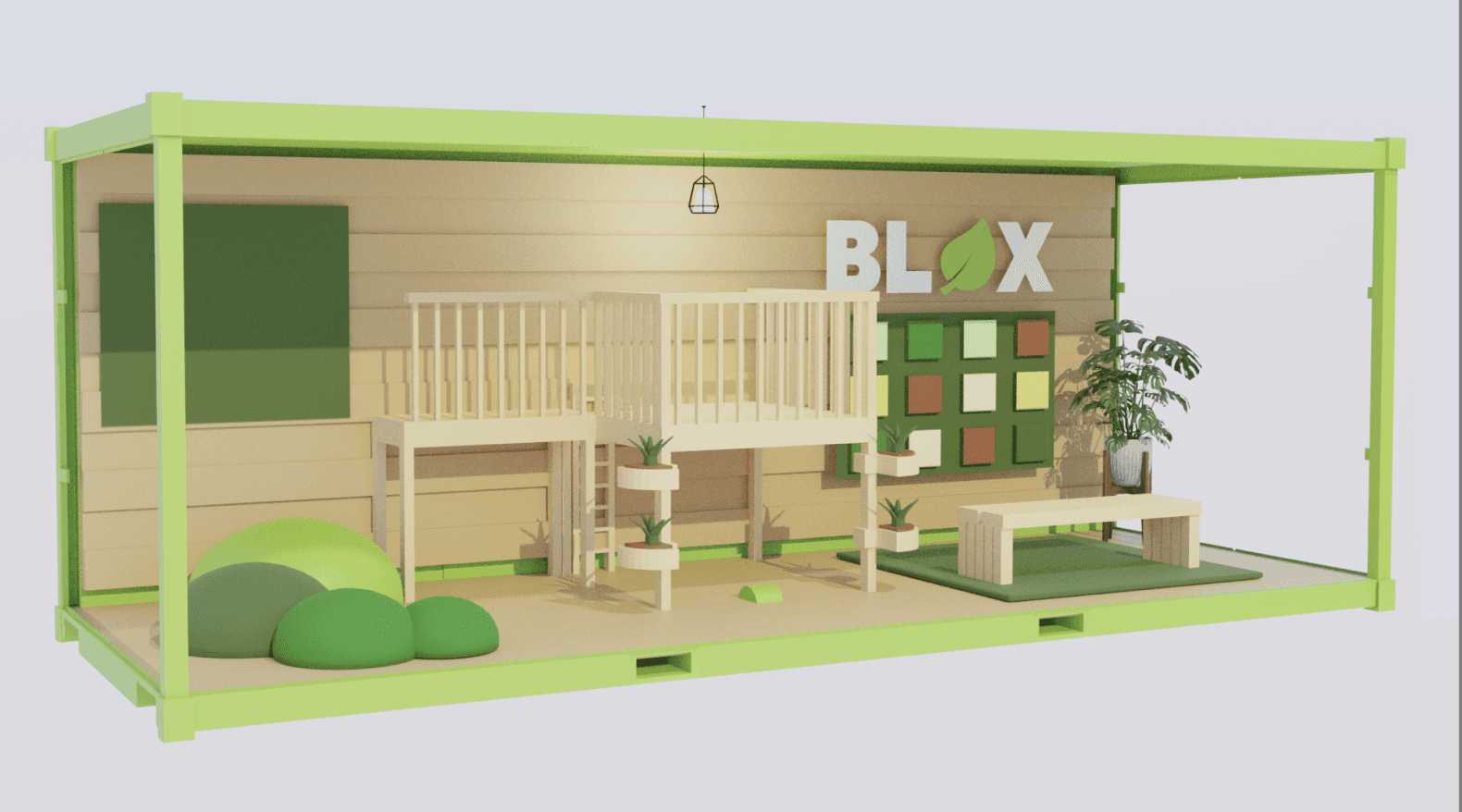
Key Principles
User-Centric Design: Each Blox is designed with a child-centered approach
Diversity of Experiences: Different Blox units offer different thematic experiences
Accessibility: Standardized layout and universal design
Connection and Collaboration: The exchange of notes transported with each Blox allow children to connect with kids from different parts of the world
Safety and Supervision: Glass window for parents and caregivers to easily supervise
Stats
60 minutes of daily unstructured free play are essential to a kid's health and social development
90% of parents agree playgrounds help shapes kids view of equality for all, regardless of race and ability levels
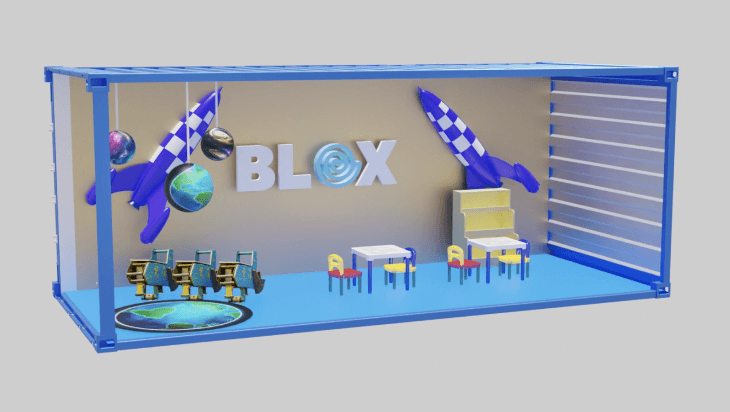
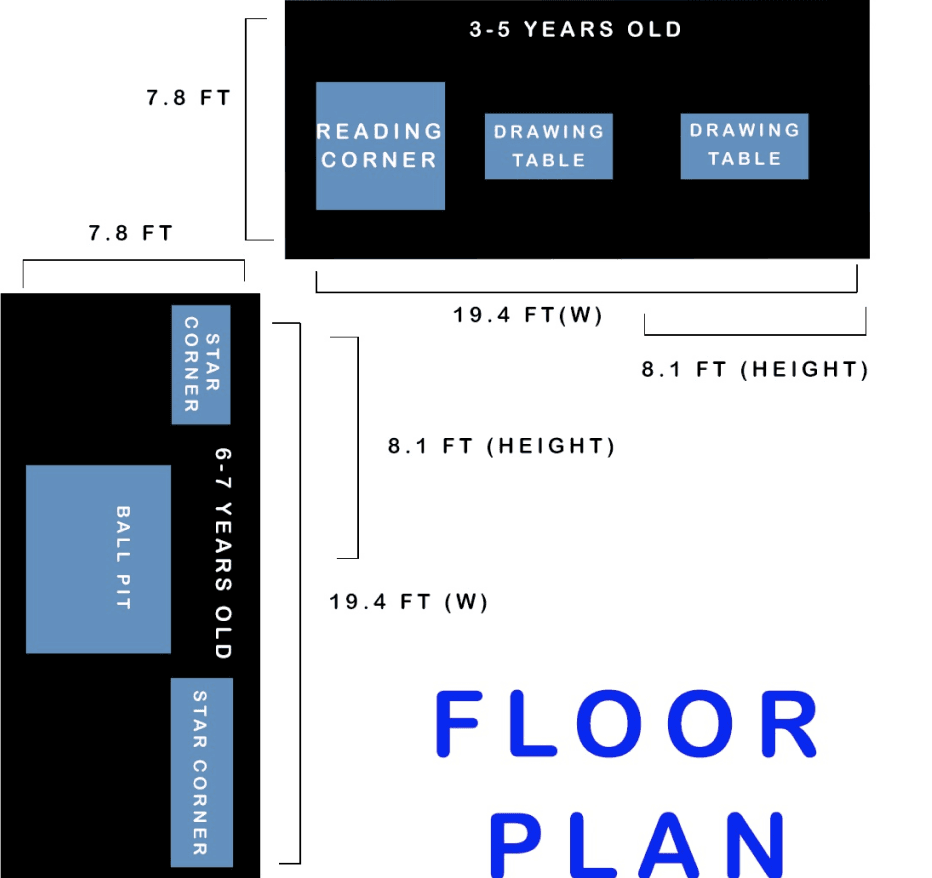
Advantages
Scalability and Reproducibility: The uniform dimensions allow each Blox unit to be easily and efficiently reproduced and scaled up, facilitating rapid deployment across different locations.
Transportation Compatibility: Standard shipping containers are designed to fit on trucks, trains, and ships. This compatibility enables the Blox units to be easily and economically transported within the city or globally.
Consistent User Experience: Despite the unique activities each Blox houses, the consistent layout provides a familiar, accessible, and navigable environment for all children. This ensures a consistent and predictable experience for the users, regardless of the Blox's location.
Conclusion
Blox is more than just a play space. It's an innovative solution that interweaves play, education, social interaction, and accessibility into a single, compact design. By harnessing the universal dimensions of a shipping container, we've been able to curate a transportable, adaptable, and scalable learning environment that caters to the developmental needs of children.


Blox
Educational playgrounds housed within containerships that can be easily transferred between cities.
Our initial task was to develop a unique 'helper' environment that best solves a specified need of youth ages 3-7.
Discovery Phase
For this project, we drew inspiration from a variety of sources, examining the work of innovative toy designers who championed learning through play. We were particularly influenced by Cas Holman, who was featured in an episode of the Netflix series Abstract: The Art of Design. Holman’s approach to creating imaginative play objects that foster creativity and collaboration resonated with our goals.
The discovery phase was an exercise in expansive thinking, where we allowed our creativity to flow freely and explored a wide range of concepts without constraining ourselves with practicalities. The goal was to uncover as many ideas as possible, some of which would later be refined and focused into a single, viable project direction.
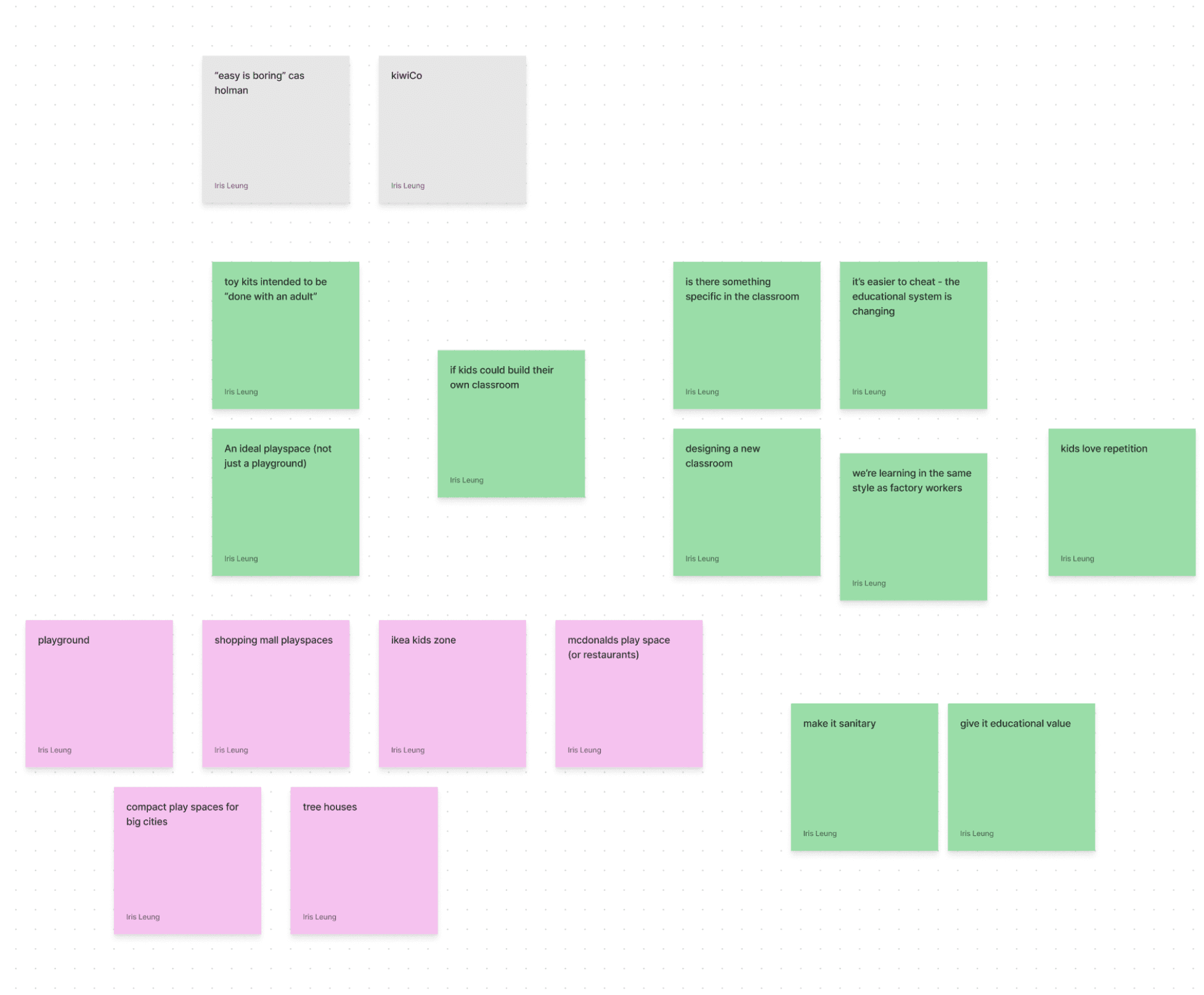
The Problem
Modern urban environments, particularly in densely populated cities, are often lacking child-friendly, accessible spaces that promote play and learning. Coupled with rapid urbanization and escalating real estate prices the availability of suitable areas where children can safely exist has decreased.

Challenge & Opportunity
How might we design a compact and transportable play environment that fosters creativity, collaboration, and cognitive development?
Introducing…


Mumbai
Recognizing the dense population of 21 million people in Mumbai, we understood the urgent need to carve out spaces for children in the city. Therefore, we strategically selected Mumbai as the launchpad for our inaugural Blox playground, embracing the theme of Space.
Location: Nehru Science Center


New York City
Despite New York City's coastal location, there's a lack of public beaches. Additionally, the city's real estate prices have emphasized a need for space-efficient solutions. These factors make NYC a prime location for an Ocean-themed Blox.
Location: New York Hall of Science


Hong Kong
Hong Kong's tightly packed high rises have limited the availability of green spaces for children. Addressing this challenge, we introduced our Forest-themed Blox in Hong Kong, offering a unique experience amidst the concrete jungle.
Location: Hong Kong Children's Discovery Museum
Product Overview
Blox is an inventive, transformative play and learning solution aimed at the urban landscapes that children aged 3-7 inhabit. This unique solution repurposes containerships into portable playgrounds, combining play and learning in a compact form that is compatible with densely populated cities.




Key Principles
User-Centric Design: Each Blox is designed with a child-centered approach
Diversity of Experiences: Different Blox units offer different thematic experiences
Accessibility: Standardized layout and universal design
Connection and Collaboration: The exchange of notes transported with each Blox allow children to connect with kids from different parts of the world
Safety and Supervision: Glass window for parents and caregivers to easily supervise
Stats
60 minutes of daily unstructured free play are essential to a kid's health and social development
90% of parents agree playgrounds help shapes kids view of equality for all, regardless of race and ability levels




Advantages
Scalability and Reproducibility: The uniform dimensions allow each Blox unit to be easily and efficiently reproduced and scaled up, facilitating rapid deployment across different locations.
Transportation Compatibility: Standard shipping containers are designed to fit on trucks, trains, and ships. This compatibility enables the Blox units to be easily and economically transported within the city or globally.
Consistent User Experience: Despite the unique activities each Blox houses, the consistent layout provides a familiar, accessible, and navigable environment for all children. This ensures a consistent and predictable experience for the users, regardless of the Blox's location.
Conclusion
Blox is more than just a play space. It's an innovative solution that interweaves play, education, social interaction, and accessibility into a single, compact design. By harnessing the universal dimensions of a shipping container, we've been able to curate a transportable, adaptable, and scalable learning environment that caters to the developmental needs of children.




Blox
Educational playgrounds housed within containerships that can be easily transferred between cities.
Connect to Content
Add layers or components to swipe between.
Our initial task was to develop a unique 'helper' environment that best solves a specified need of youth ages 3-7.
Discovery Phase
For this project, we drew inspiration from a variety of sources, examining the work of innovative toy designers who championed learning through play. We were particularly influenced by Cas Holman, who was featured in an episode of the Netflix series Abstract: The Art of Design. Holman’s approach to creating imaginative play objects that foster creativity and collaboration resonated with our goals.
The discovery phase was an exercise in expansive thinking, where we allowed our creativity to flow freely and explored a wide range of concepts without constraining ourselves with practicalities. The goal was to uncover as many ideas as possible, some of which would later be refined and focused into a single, viable project direction.

The Problem
Modern urban environments, particularly in densely populated cities, are often lacking child-friendly, accessible spaces that promote play and learning. Coupled with rapid urbanization and escalating real estate prices the availability of suitable areas where children can safely exist has decreased.

Challenge & Opportunity
How might we design a compact and transportable play environment that fosters creativity, collaboration, and cognitive development?
Introducing…


Mumbai
Recognizing the dense population of 21 million people in Mumbai, we understood the urgent need to carve out spaces for children in the city. Therefore, we strategically selected Mumbai as the launchpad for our inaugural Blox playground, embracing the theme of Space.
Location: Nehru Science Center


New York City
Despite New York City's coastal location, there's a lack of public beaches. Additionally, the city's real estate prices have emphasized a need for space-efficient solutions. These factors make NYC a prime location for an Ocean-themed Blox.
Location: New York Hall of Science


Hong Kong
Hong Kong's tightly packed high rises have limited the availability of green spaces for children. Addressing this challenge, we introduced our Forest-themed Blox in Hong Kong, offering a unique experience amidst the concrete jungle.
Location: Hong Kong Children's Discovery Museum
Product Overview
Blox is an inventive, transformative play and learning solution aimed at the urban landscapes that children aged 3-7 inhabit. This unique solution repurposes containerships into portable playgrounds, combining play and learning in a compact form that is compatible with densely populated cities.




Key Principles
User-Centric Design: Each Blox is designed with a child-centered approach
Diversity of Experiences: Different Blox units offer different thematic experiences
Accessibility: Standardized layout and universal design
Connection and Collaboration: The exchange of notes transported with each Blox allow children to connect with kids from different parts of the world
Safety and Supervision: Glass window for parents and caregivers to easily supervise
Stats
60 minutes of daily unstructured free play are essential to a kid's health and social development
90% of parents agree playgrounds help shapes kids view of equality for all, regardless of race and ability levels




Advantages
Scalability and Reproducibility: The uniform dimensions allow each Blox unit to be easily and efficiently reproduced and scaled up, facilitating rapid deployment across different locations.
Transportation Compatibility: Standard shipping containers are designed to fit on trucks, trains, and ships. This compatibility enables the Blox units to be easily and economically transported within the city or globally.
Consistent User Experience: Despite the unique activities each Blox houses, the consistent layout provides a familiar, accessible, and navigable environment for all children. This ensures a consistent and predictable experience for the users, regardless of the Blox's location.
Conclusion
Blox is more than just a play space. It's an innovative solution that interweaves play, education, social interaction, and accessibility into a single, compact design. By harnessing the universal dimensions of a shipping container, we've been able to curate a transportable, adaptable, and scalable learning environment that caters to the developmental needs of children.




Blox
Educational playgrounds housed within containerships that can be easily transferred between cities.
Connect to Content
Add layers or components to swipe between.
Our initial task was to develop a unique 'helper' environment that best solves a specified need of youth ages 3-7.
Discovery Phase
For this project, we drew inspiration from a variety of sources, examining the work of innovative toy designers who championed learning through play. We were particularly influenced by Cas Holman, who was featured in an episode of the Netflix series Abstract: The Art of Design. Holman’s approach to creating imaginative play objects that foster creativity and collaboration resonated with our goals.
The discovery phase was an exercise in expansive thinking, where we allowed our creativity to flow freely and explored a wide range of concepts without constraining ourselves with practicalities. The goal was to uncover as many ideas as possible, some of which would later be refined and focused into a single, viable project direction.

The Problem
Modern urban environments, particularly in densely populated cities, are often lacking child-friendly, accessible spaces that promote play and learning. Coupled with rapid urbanization and escalating real estate prices the availability of suitable areas where children can safely exist has decreased.

Challenge & Opportunity
How might we design a compact and transportable play environment that fosters creativity, collaboration, and cognitive development?

